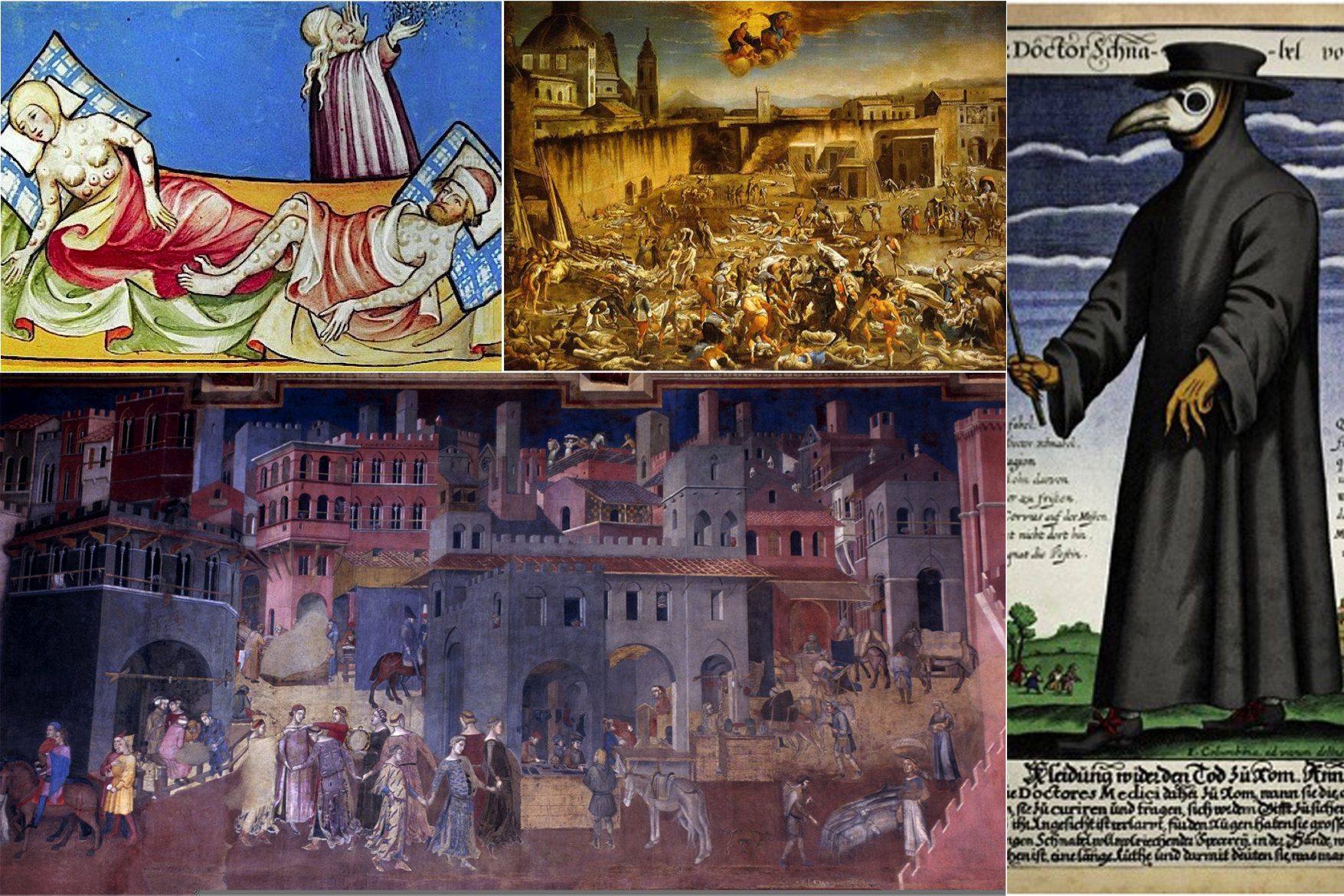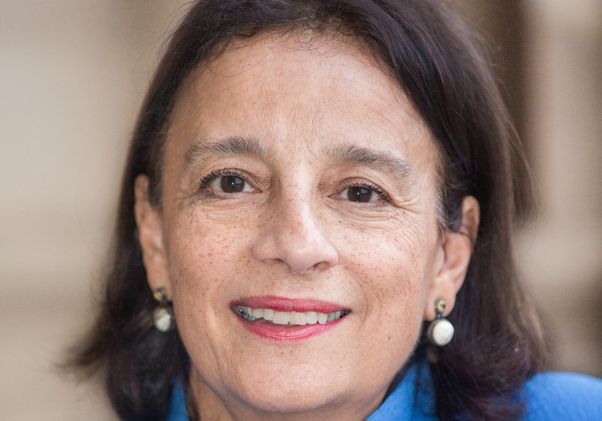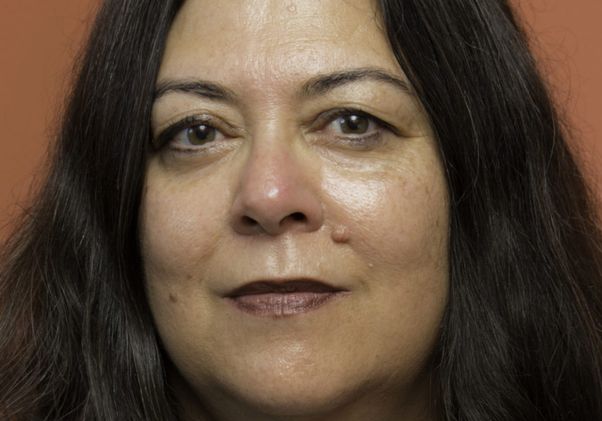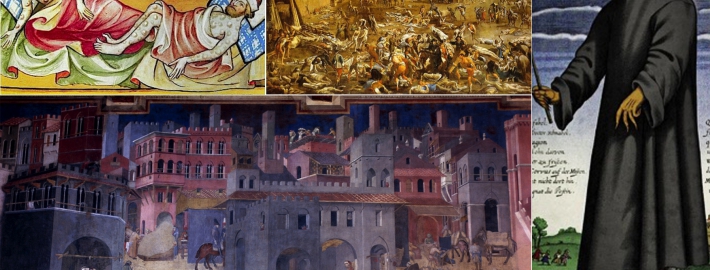Faculty get creative to teach perspectives on the COVID-19 pandemic

Art historian Charlene Villaseñor Black showed her class how art changed before and after the bubonic plague struck Europe to help her students see how artists might adapt their work to the COVID-19 pandemic. (Photo Credit: UCLA)
The screen shows the familiar grid of small faces but everyone’s focused on the guest speaker, a student joining the class from his home in Wuhan, China, eager for their chances to ask questions.
“Can you describe the Chinese health care system and any differences you have experienced between its workings and that of the U.S. health care system?” Jonathan Gong asked Shengan Zhan. The UCLA geography graduate student was joining geography professor Michael Shin’s seminar class called “Global Experiences and Perspectives on COVID-19” via Zoom.
“It is usually very easy to see a doctor,” Zhan said. “However, with the coronavirus outbreak, the system was just flooded and overwhelmed by the high number of people seeking treatment.”
Gurugowtham Ulaganathan asked, “How has this affected you and your family personally?”
“The lock-down is inconvenient but most people are coping,” Zhan said. “My parents are professors at the university in Wuhan, and they are teaching online like we are here at UCLA.”
Hearing directly from Zhan the students see how COVID-19 has connected experiences around the world.
Opportunities like this, to participate in intimate conversations with someone who can share what it’s like to live in the global ground zero of the novel coronavirus pandemic are part of what make a UCLA education so special.
As the world grapples with COVID-19 and governments, institutions and individuals adapt to meet this moment, UCLA has been forced to change not only how it teaches — since late March, all courses have been conducted remotely — but just as importantly, what it teaches.
A shining example of how UCLA fulfills its mission
UCLA’s Fiat Lux seminar program has provided a platform to give faculty and students a global, multidisciplinary perspective of the pandemic, continuing a long tradition of teaching students to better understand the complexities of the world and forming community around current events. Founded in 2001, Fiat Lux seminars (named after the University of California’s Latin motto “Let there be Light”) were born in the wake of 9/11 as a way for students and faculty to explore, discuss and make sense of the terrorist attack.
Patricia Turner, dean and vice provost of undergraduate education and one of UCLA’s biggest Fiat Lux champions, said educators are always looking for teachable moments. Offering seminars about events like 9/11 and now COVID-19 provides students with an opportunity to research, discuss and make sense of these events.

Patricia Turner (Photo Credit: UCLA)
“Each Fiat Lux provides its own lens through which to understand the virus’s impact on the world, whether the subject is public health, nutrition, sustainability or something else entirely,” Turner said. “Ideally, students will feel like they are in a caring academic community and come away with a perspective from which to examine their own feelings about the virus and its impact. It’s just one of the ways UCLA supports students in tumultuous times.”
With the support of Fiat Lux’s faculty advisory committee, a call for proposals went out at the end of winter quarter, but with a strict deadline: seminars would be taught the very next quarter which would begin in just a few weeks.
Pia Palomo, academic coordinator for undergraduate education initiatives in the UCLA College, and Scott Chandler, faculty advisory committee chair, said they thought they’d be lucky to receive 10 proposals. Instead, they got 25.
“Ray Knapp, professor of musicology, had talked with some other colleagues about, ‘Hey, this is a great opportunity to use the spirit of Fiat Lux to build community to talk about what’s happening, and there’s already a mechanism to do it,’” Palomo said. Faculty in other schools, including Kyle McJunkin in the Fielding School of Public Health, were also eager to begin teaching about COVID-19 as soon as possible.
The topics were as varied as the faculty who submitted them — from political science and public policy professor Susanne Lohman’s “The Ethics of Pandemics” to music professor Frank Heuser’s “Responding to Coronavirus Through Song.” Faculty in departments spanning English, gender studies, African American studies, sociology and education all taught COVID-19 seminars. Chancellor Gene Block even led a seminar titled “University Leadership During Pandemics.”
More than just classes
For faculty and students, the Fiat Lux COVID-19 seminars were not just an opportunity to study the pandemic. In fact, building community around this unprecedented and at times frightening crisis as Bruins are scattered across the world under quarantine and stay-at-home orders was equally if not more important.
Art history professor Charlene Villaseñor Black is a veteran in teaching Fiat Lux seminars and jumped at the chance to teach “Art in Times of Contagion,” which examines artistic responses to pandemics of past and present.

Charlene Villaseñor Black (Photo Credit: UCLA)
The course has included examinations of historical art, such as Mexican art in the 16th and 17th centuries during the wave of epidemics brought by European colonizers and artistic responses to the medieval European plague of the 14th century. Students also looked at modern examples including the 2013 film “World War Z” and engaged in a writing exercise to create their own artistic response to COVID-19.
“I want students to have an awareness that we’ve been here before and an awareness of how the arts can provide sustenance, respite, and hope for us,” Black said. “This is the moment to really think about how the humanities and the arts make us more human.”
As faculty-in-residence in Sproul Hall, it was the sight of her students moving out of their dorms as the campus shut down that most profoundly affected Black and motivated her to think about what she could do to help them.
“We couldn’t even help them move out really because of social distancing. So it was heartbreaking. I didn’t get to say goodbye to a lot of people,” Black said. “I was thinking deeply about what is the role of the faculty-in residence in the current pandemic? How are we going to reach out to our students?”
She thought the idea to offer COVID-19-themed Fiat Lux seminars was “perfect.”
“I thought a lot about the arts at this moment,” she said. “We’ve seen so many arts offerings on social media, Facebook Live broadcasts, artists doing workshops, artists doing live talks about their practice. So I was struck by how the arts became a refuge for us.”
Seminars connect students forced into separation
Aileen Carey, a senior English major, took three Fiat Lux seminars including Black’s from her apartment in Westwood, where she decided to stay for her final quarter instead of going home to New Jersey. She also took Robert Kim-Farley’s “COVID-19 From the Perspective of a Public Health Medical Epidemiologist” and Caroline Streeter’s “Viral Media During a Viral Pandemic: Social Media, Music and COVID-19.”
Carey said listening to her professors discuss the pandemic from an academic point of view helped her get a more objective perspective on what she hears on the news every day. And it’s “oddly soothing” to spend time with fellow Bruins discussing the issues.
“It highlights that this is a collective experience because everyone in the class is here and wants to talk about it,” Carey said. “It’s surreal seeing my classmates sitting in their houses on Zoom but it helps show that these people are all going through the exact same thing I’m going through.”
Her art history seminar in particular has made Carey more aware of how art — including her own — is influenced by major events in history.
“That fascinates me because I wonder how my writing will change after COVID-19 and I wonder how mainstream media will change, because every industry is different now,” she said.

COVID-19 cases in China as of April 9, 2020 (Photo Credit: Photo by KOBU Agency on Unsplash)
In his seminar about global experiences on COVID-19, Shin wanted to offer students the opportunity to meet people from around the world and hear directly from them about how their lives have been affected by the pandemic. He invited guest speakers including Zhan who is his former teaching assistant and professors at the University of Milan and Hong Kong University to share their experiences with the class and answer students’ questions.
Freshman human biology major Victoria Li was interested in taking Shin’s seminar to gain a more global perspective of COVID-19. The seminar has already inspired her to continue pursuing public health in her studies.
“In the U.S. we get a very one-sided story of this epidemic and we don’t get to hear how real people are living through the same thing but in a different way around the world,” Li said. “With this whole situation and the class on COVID, it’s reaffirmed my interest in public health and how to deal with situations like this.”
Both Li and Carey said they’re proud and grateful that, through Fiat Lux, UCLA is offering students the opportunity to learn about the COVID-19 pandemic, to think critically and lean on each other to get through it.
“Having this moment to appreciate the staff who are excited to talk about these issues and the students who are volunteering to learn shows the best of academia and what this institution could be,” Carey said.
Fiat Lux has always offered students and faculty alike a way to explore new areas of interest and expand their perspectives, said history professor Vinay Lal, who is teaching a Fiat Lux seminar on pandemics throughout history. As we all grapple with COVID-19 together, the Fiat Lux mission seems to adopt a new and urgent meaning.
“Fiat Lux is a way for the faculty to engage themselves, to indulge their intellectual curiosity. And for the students, it’s a chance to say, let me see if I can become intellectually aware of the world around me,” Lal said. “Coronavirus is something that is out of our realm of experience. And so we need to be able to find some way to comprehend it.”
This article originally appeared in the UCLA Newsroom.




